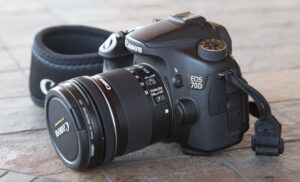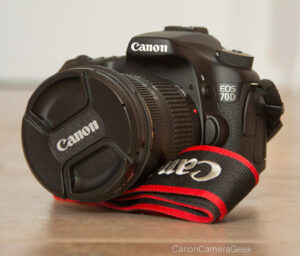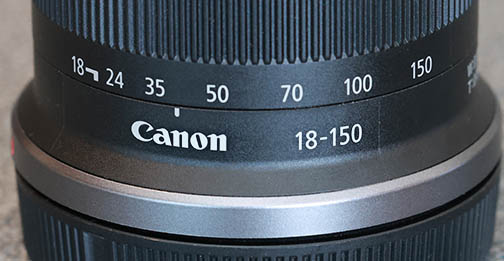
[ad_1]
Best beginner R7 Lens
I was excited about getting my EOS R7, but I had to take a in-depth look at the best lenses for my Canon R7. This post will give you a quick start list of lenses that will work well with the mirrorless R7as well as a more detailed look at the lenses that match the genres of photography you want to shoot with your R7 camera.
R7 Lens Compatibility
The number one question that comes up with this camera is what lenses will fit on the R7. The Canon R7 is compatible with RF, and RF-S lenses. You can also use the older EF and EF-S lenses if you use one of the 3 different versions of the EF-EOS R adapter.
Although it has a crop sensor, you can use full frame lenses on the R7. Canon EOS-M lenses will not work with the R7 camera.
There are many, older and recently upgraded EF and EF-S lenses available, as Canon has been making them for quite some time now. Alternatively, you can buy one of the newly-designed “R” series of lenses which are made to match perfectly with Canon’s full-frame mirrorless cameras as well as APS-C (crop) mirrorless cameras like the R7.
RF LENSES: One potentially big advantage of using an R (and RF-S) lens on your R7 is the added feature of using the built-in, customizable, control ring on the lens barrel. You can customize that ring to adjust a variety of settings. I set mine to exposure compensation.
EF LENSES: EF lenses are the universal lenses, like type O negative blood is the universal donor. You can use an EF lens on full-frame or APS-C DLSR, as well as on full-frame and APS-C mirrorless cameras (along with one of the adapters).
Table of R7 Lenses
| CANON LENS | EQUIVALENT FOCAL LENGTH |
DESCRIPTION | COMMENTS* |
| EF-S 10-22mm | 16-35mm | Ultra wide | $600. f/3.5-4.5. Use with EOS-EF R adapter |
| RF-S 18-45mm | 29-72mm | Wide to short tele | $300. f/4.5-6.3. Most economical general purpose. Compact size. |
| RF-S 18-150mm | 29-240mm | Wide to tele | $500. f/3.5-6.3. Great general purpose. 8.3x zoom range |
| RF-S 55-210mm | 88-336mm | Telephoto | $350. f/5.0- f/7.1. Powerful telephoto zoom in a lightweight and portable design. |
| RF 100mm | 160mm | Macro | $1,100. f/2.8. 1.4X maximum macro magnification. |
Now, let’s take a deeper look at the best lenses for your CanonR7 in more detail.
EF-S 10-XXmm Lens
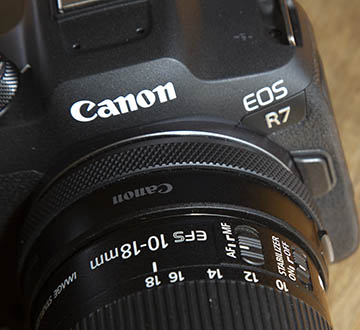 My EF-S 10-18mm lens
My EF-S 10-18mm lenson R7 using EOS-EF R adapter
If you want to shoot wide landscape, architecture, or strong perspective photos you should consider one of the ultra wide angle EF-S zoom lenses for your R7. There is a 10-18mm that was released in 2014 (see mine pictured here) and a 10-22mm released in 2004.
I chose the EF 10-18mm because of it’s cheaper price tag. The 10-22mm is faster with a larger maximum aperture. The 10-18mm has Image stabilization.
Both of these EF-S lenses would require you to use the EOS-EF R adapter, but the only alternative (at the time of this post) specifically for mirrorless is a Canon RF 14-35mm f/4 L. This is a top tier “L” lens, but is 3X the cost and doesn’t go as wide as the two EF-S lenses.
It’s very likely that Canon will release an RF-S 11-22mm f/4.5-5.6 in the first half of 2023. That will fill a void for super wide angle lenses for the R7 camera.
Canon RF 18-45mm F/4.5-6.3
The RF-S 18-45mm lens is the most economical starter lens for the R7 in the entire RF/RF-S mirrorless lens lineup. It’s compact in size and light in weight, making it convenient as a camera/lens combination to carry along with you as you travel.
With a maximum aperture of f/4.5 it lags behind its faster, full-sized counterpart, the professional RF 15-35mm F/2.8 L which sells at 8 times the price at $2400.
Canon RF 18-150mm F/3.5-6.3
If you want one go-to lens, the 18-150mm lens is the perfect general purpose, walk-around, lens for the R7. This lens is the alternative to the very versatile EF-S 18-135, but with a little more reach at the telephoto end of the zoom range.
It’s not particularly fast at f/3.5-f/6.3, but the impressive high ISO performance of the R7 can be employed in those low light shooting situations. If you want to keep things as simple as possible and prefer just one lens to handle all of your photography, the 18-150 is your best choice. Here’s my helpful post on what type of photography you can shoot with the 18-150 lens.
Canon RF 24-105mm F4-7.1 is STM
There are two 24-105 RF lenses. The RF 25-105mm f/4-7.1 is much cheaper than the 24-105mm f/4.0 with its constant f/4 maximum aperture throughout its zoom range. Like the EF 24-105 f/4 L lens for traditional Canon DSLRS that I use frequently, the RF 24-105 f/4 is a Canon professinal L lens with a professional lens price tag.
Although the RF 24-105mm f/4-7.1 lens is a quality lens at a bargain price, I don’t recommend it for the R7. You’d be better off sticking with one of the smaller RF-S lenses.
Canon RF-S 55-210mm f/5-7.1 IS STM
The RF-S 55-210mm lens is a great fit for the R7 if you are interested in photographing wildlife, birds, and sports. It’s a bargain priced medium to long telephoto that gives you a decent amount of magnification when paired along with the 1.6x crop sensor of the R7.
You can make it your 2nd lens for your R7. Combine the18-45 lens with the 55-210 lens and you’ve got an impressive range of focal lengths covered at a reasonable cost. It’s a relatively “slow” lens with its maximum aperture of f/5.0 at 55mm, but that’s why it is compact, light, easy to use, and affordable.
Canon RF 100mm f/2.8 L IS Macro
This is the only full-frame RF telephoto macro lens that made it to the R7 lenses list. I agree it’s a pricey lens, no doubt. It’s included just because it’s such a great lens, especially if you’re interested in doing some amazing macro photography.
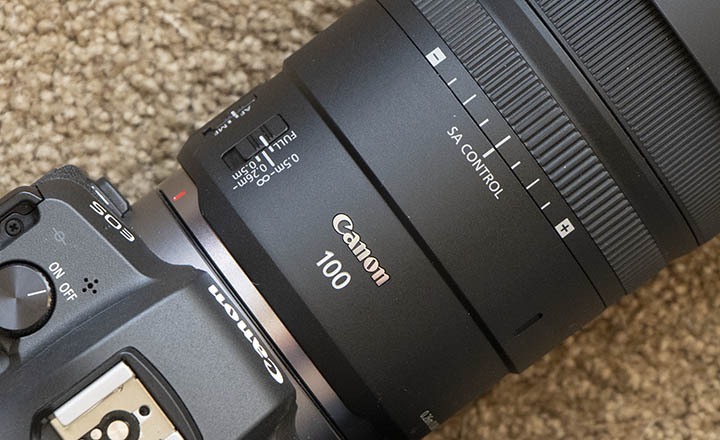 Super sharp macro lens
Super sharp macro lensGreat magnification with the R7
The1.4:1 macro magnification of the RF 100mm f/2.8 lens opens up a world of subject matter that isn’t easily explored with a regular lens. It also doubles as a great portrait lens for shooting headshots and small group photos. At f/2.8 it’s great for low light shooting and gives you great bokeh blur of the background when you want it.
Canon RF 100-500mm f/4.5-7.1 L
Although it’s not particularly fast, this super telephoto is an enticing choice for your R7. More than long enough for great bird, wildlife, and sports photo enthusiasts, it’s also very versatile for such a powerful lens, boasting a 5X zoom.
It’s a professional Canon L lens and comes with a professional price tag which will keep most hobbyist photographers away, unless they have the financial wherewithal and desire to shoot pro-level photography of birds, wildlife, or large-venue sporting events.
Canon RF 600mm f/11 IS STM
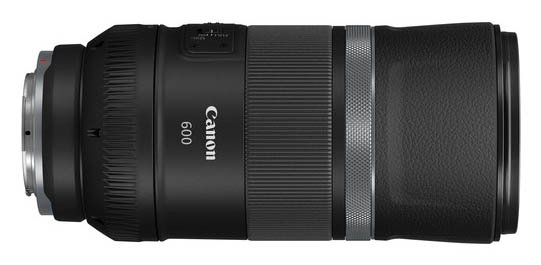 Lenses like this require using good technique,
Lenses like this require using good technique,The RF 600mm lens only weighs 2 lbs.
The Canon RF 600mm f/11 IS STM Lens is a specialty lens with a narrow range of applications that will appeal to a limited number of Canon shooters. I still include it on the short list of lenses for R7 shooters because of its long focal length at a remarkably low price point.
To get 600mm of length-That’s an angle of view equivalent to a 960mm lens with the R7 1.6x crop factor-for under $800 is very enticing for bird geeks and wildlife enthusiasts who would otherwise not be able to participate in shooting with a lens with this much reach.
The RF 600mm lens does come with disadvantages. It has a constant aperture of f/11. The RF auto-focusing is really good, but if you’re shooting in the shadows at f/ll, the focusing speed could suffer. Additionally, the narrow 4° 10′ angle of view can make it challenging to find your target through the viewfinder, although that is true with any high-powered 600mm lens or longer.
As I covered in my R7 High ISO Test, the R7 does remarkably well maintaining image quality in dim shooting situations when you shoot with higher ISO settings, but shooting at dusk or dawn may be challenging as well
Summary of R7 Lenses
The best lenses for your Canon R7 will depend on your shooting needs and preferences. As you can see from the partial list of best R7 lenses above, there’s certainly plenty to choose from.
The best lenses for the R7, in terms of affordability and portability are the smaller RF-S lenses instead of the larger pricier RF lenses. The overall top recommended R7 lens is the RF-S 18-150mm F/3.5-5.6 IS STM.
Have a blast. Shoot a Canon!
As an Amazon affiliate Canon Camera Geek receives a small commission from qualifying purchases, at NO added cost to you.

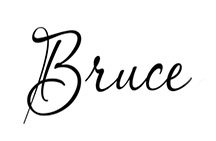
Bruce Lovelace is the publisher of Canon Camera Geek. Read more about him on the About Page. He also publishes how to articles and camera gear reviews at the Photography Tips website.
View some of Bruce’s photos on Instagram and Flickr. Join the tribe of followers on YouTube. Bruce also runs photo workshops and provides 1 on 1 digital photography coaching.
[ad_2]
Source link


